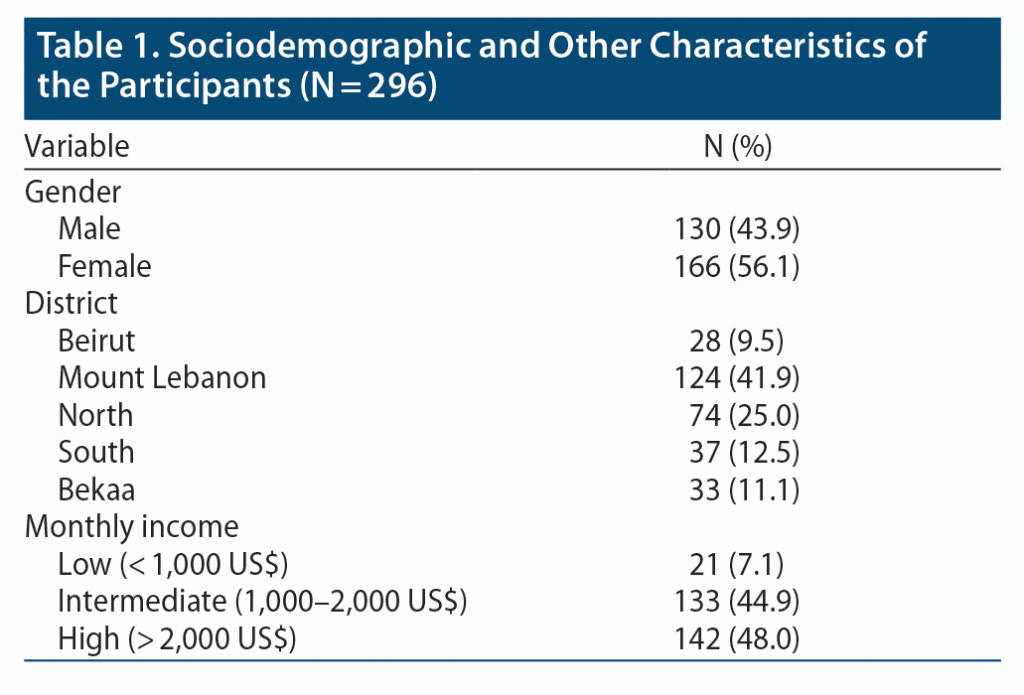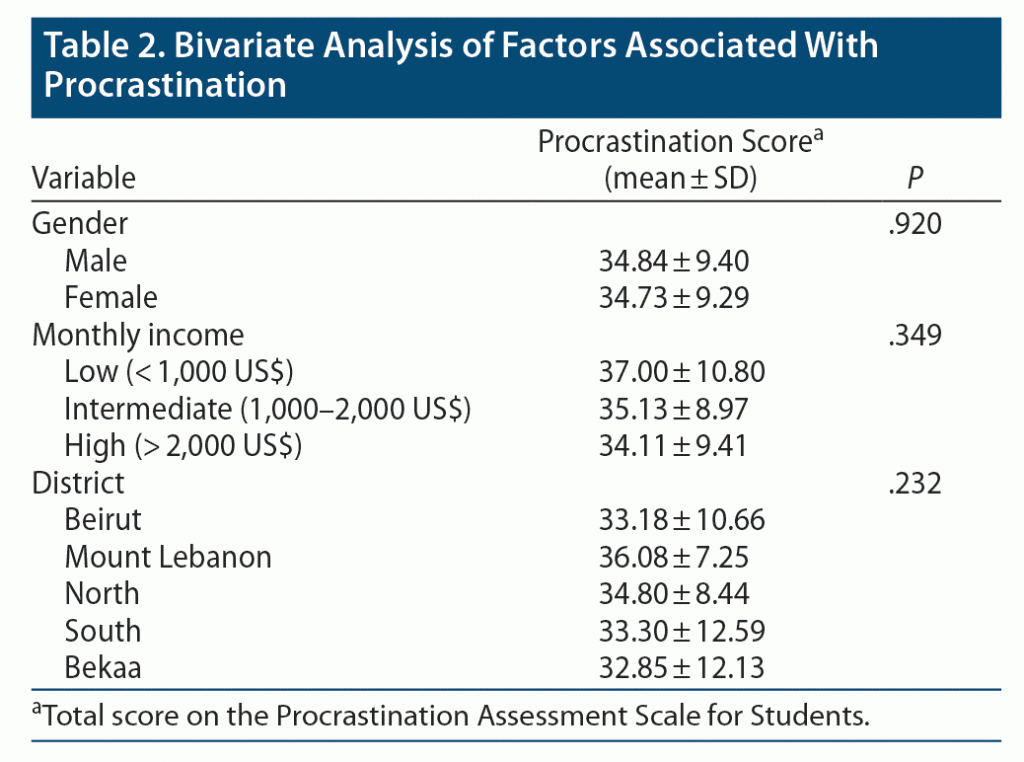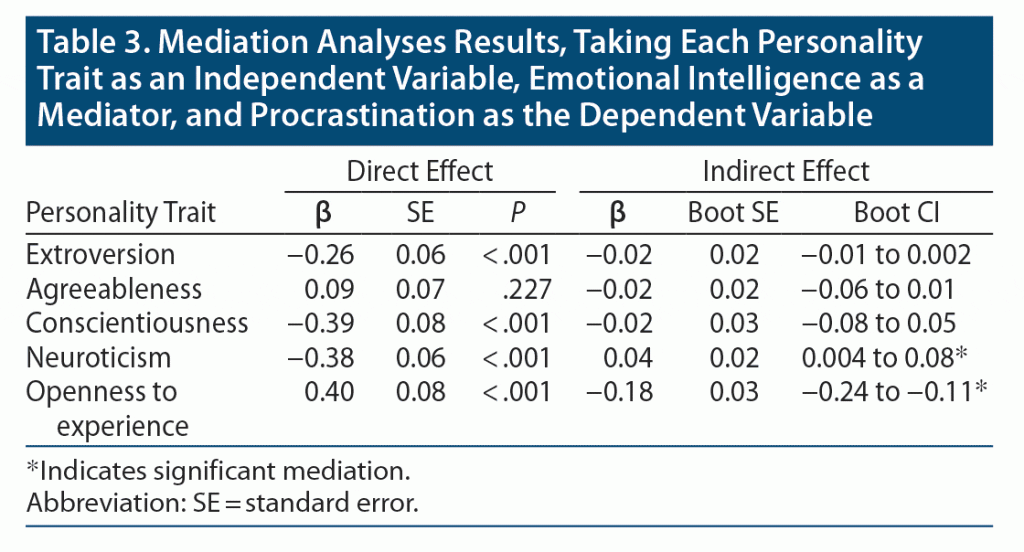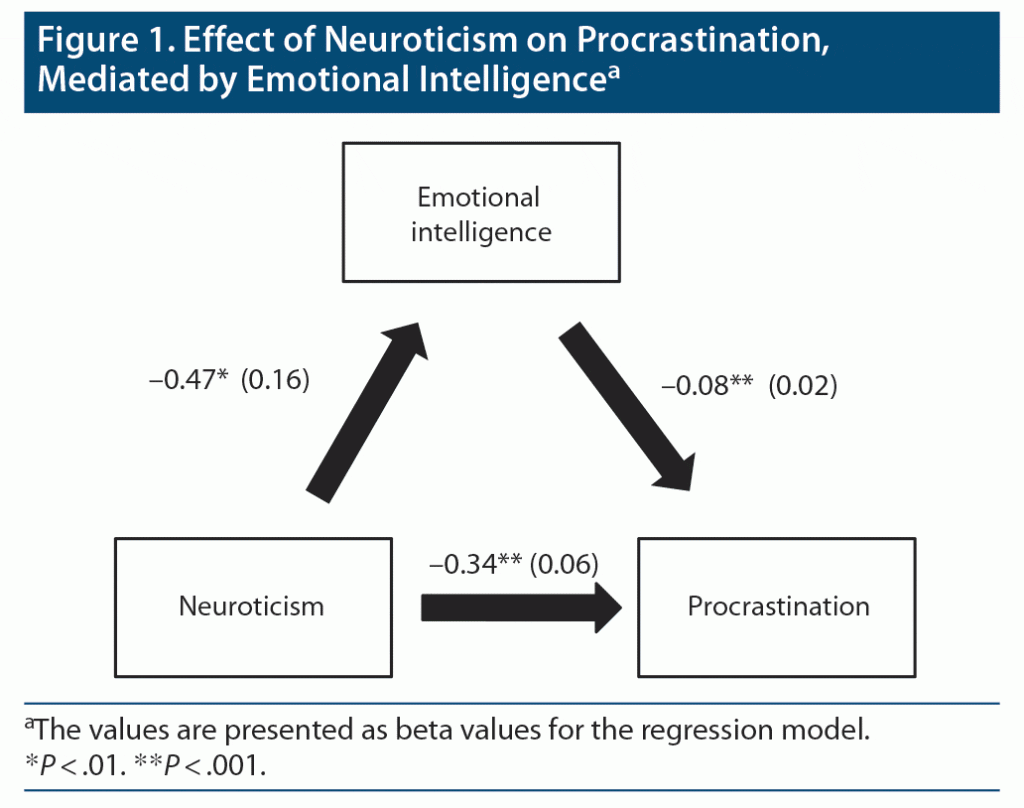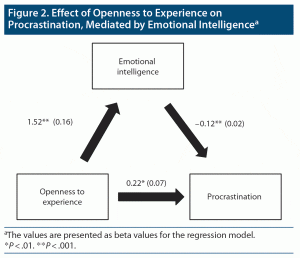ABSTRACT
Objective: To investigate the relationship between personality traits and procrastination and the mediating role of emotional intelligence (EI) among a sample of Lebanese medical students.
Methods: This cross-sectional study was conducted between June and December 2019. A total of 296 students filled out a questionnaire that consisted of sociodemographic characteristics and the following scales: Procrastination Assessment Scale for Students, Big Five Personality Test, and Quick Emotional Intelligence Self-Assessment Scale.
Results: Since no bivariate associations were found between sociodemographic variables, they were not included in the mediation analysis. EI mediated the association between neuroticism and procrastination. Neuroticism was significantly associated with lower EI (P < .01) and lower procrastination (P < .001), whereas higher EI was significantly associated with lower procrastination (P < .001). EI mediated the association between openness to experience and procrastination. Openness to experience was significantly associated with higher EI and higher procrastination (P < .001), whereas higher EI was significantly associated with lower procrastination (P < .001).
Conclusions: The results emphasize the role of EI in personality and procrastination and highlight its importance in clinical settings. It is important for clinicians, especially school and university counselors, to identify risk factors beyond low levels of adaptive personality traits such as EI within the clinical setting to reduce irrational procrastination and improve academic performance.
Prim Care Companion CNS Disord 2023;25(2):22m03246
To cite: Awad E, El Othman R, Hallit S, et al. Association between personality traits and procrastination and the mediating effect of emotional intelligence in Lebanese medical students. Prim Care Companion CNS Disord. 2023;25(2):22m03246.
To share: https://doi.org/10.4088/PCC.22m03246
© 2023 Physicians Postgraduate Press, Inc.
aFaculty of Arts and Sciences, Holy Spirit University of Kaslik, Jounieh, Lebanon
bSchool of Medicine and Medical Sciences, Holy Spirit University of Kaslik, Jounieh, Lebanon
cResearch Department, Psychiatric Hospital of the Cross, Jal Eddib, Lebanon
dApplied Science Research Center, Applied Science Private University, Amman, Jordan
eSocial and Education Sciences Department, School of Arts and Sciences, Lebanese American University, Jbeil, Lebanon
‡Drs Hallit and Obeid are last co-authors.
*Corresponding authors: Souheil Hallit, PharmD, MSc, MPH, PhD, School of Medicine and Medical Sciences, Holy Spirit University of Kaslik, PO Box 446, Jounieh, Lebanon ([email protected]) and Sahar Obeid, PhD, Social and Education Sciences Department, School of Arts and Sciences, Lebanese American University, Jbeil, Lebanon ([email protected]).
Procrastination is the act of unnecessarily avoiding or deferring the accomplishment of a certain task despite feelings of discomfort and awareness of its adverse consequences.1 This reluctance is often associated with academic tasks such as finishing homework, writing assignments, and studying for exams.2 In the majority of cases, procrastination can be explained by internal sources related to the individual, including affective state, physical well-being, and personality characteristics.3 Feelings of shame, guilt, and low quality of work are some repercussions associated with failing to effectively self-regulate and organize academic responsibilities.4 Only overall procrastination, rather than the specific type of procrastination, will be discussed in this article.
Multiple studies have examined the prevalence of procrastination among students, with rates varying but remaining noticeably high across countries: 63% in Iran,5 50% in Turkey,6 74.1% in China,7 and 32.9% in the Caribbean countries.8 Personality has been an evidence-supported predictor of procrastination for decades.9–15 The big 5 personality traits model is often utilized to assess the relation between procrastination and personality.16–20 The big 5 personality traits consist of openness to experience, interest and acceptance of newness; conscientiousness, acting with awareness and carefulness; extraversion, enjoyment of interaction with others; agreeableness, tendency to be social and pleasant; and neuroticism, negative affect.21 Higher extraversion and higher neuroticism were positively correlated with higher procrastination in a sample of full-time university students.22 Individuals who scored high on conscientiousness and agreeableness were less likely to engage in academic procrastination.23 Another study24 also found an association between higher conscientiousness, openness, extraversion, and agreeableness and less academic procrastination. Moreover, a recent investigation found that the conscientiousness score strongly predicted the level of procrastination25; conscientiousness and its facets were the strongest correlates with procrastination.
Emotional intelligence (EI) can be defined as the ability to detect, manage adequately, and employ emotions toward adaptive behaviors.26 EI was found to have an indirect effect on procrastination, subsequently impacting academic performance,27 while other results detected no relationship between EI and procrastination.28 Findings show a negative link between EI and academic procrastination; however, the underlying mechanism of this association remains unclear,29 which suggests that other variables such as personality are involved. Students who procrastinated because they perform better during short periods of time due to the pressure and epinephrine rush were more likely to have higher EI and adaptive personality trait scores.30 When taking into account sociodemographic and personality characteristics, EI had a negative correlation with academic procrastination.31
Medical students face a different set of challenges compared to attending physicians, residents, or nurses in terms of constant studying, clinical clerkships, frequent competitive examinations, social isolation from friends/family, and financial stressors. In Lebanon, the socioeconomic and political situation is and has been chronically unstable for several decades.32 This socioeconomic and political instability combined with a constant level of academic and financial stress may affect students’ mental health and achievement.33,34 Additionally, many Lebanese medical students consider emigrating to continue medical training, adding a significant psychosocial burden on this group of vulnerable young adults. A positive link exists between EI and procrastination among Middle Eastern medical students35; however, this relation has yet to be explored in Lebanon. Additionally, apart from a study that found a negative relation between EI and academic procrastination,36 no other inquiry was made about personality, EI, and academic procrastination among medical students in Lebanon. Due to the ambiguous relation between EI and academic procrastination, this study investigated the mediating effect of EI between personality traits and academic procrastination. We hypothesize that (1) higher EI, conscientiousness, agreeableness, and openness to experience would be associated with lower procrastination, whereas higher neuroticism and extraversion would be associated with higher procrastination and (2) EI would mediate the relation between personality traits (neuroticism, openness to experience, conscientiousness, extraversion, and agreeableness) and procrastination.
METHODS
Study Design
The selection process took place at the 7 national schools of medicine in Lebanon. The inclusion criteria consisted of the following: students must be enrolled in a full-time general medicine program and of legal age (over 18 years). A total of 296 students participated by filling out an online (via Google forms) or paper questionnaire after providing their informed consent; no compensation was offered. The study methodology has been used elsewhere.37,38 This cross-sectional study was conducted between June and December 2019.
Sample Size Calculation
The minimal sample size was calculated using the Epi info program, with an acceptable margin of error of 5% and an expected variance of procrastination among medical students in the Middle East of 29.25%–63%5,39 for 5,531 general medicine students in Lebanon.40 The needed number of participants was a minimum of 296.
Questionnaire and Variables
Given that all 7 national faculties of medicine require a prerequisite of a good English knowledge, the questionnaire was filled out in English. The clarity of the questionnaire was assessed using a pilot test prior to the data collection. Pilot test–related data were not entered in the final database. The first part of the questionnaire consisted of sociodemographic characteristics, such as age, gender, university, and medical history. The second part included the following measures.
Procrastination Assessment Scale for Students. This scale was used to examine procrastination among the sample. The scale is divided into sections, each including questions about a specific academic task. It includes 12 items, and each item is scored on a 5-point Likert-type scale.41 A higher total score indicates higher procrastination (Cronbach α = 0.880).
Big Five Personality Test. Personality traits were assessed using the Big Five Personality Test, which includes the 5 broad personality traits: openness to experience (Cronbach α = 0.718), conscientiousness (Cronbach α = 0.640), extraversion (Cronbach α = 0.880), agreeableness (Cronbach α = 0.668), and neuroticism (Cronbach α = 0.761). It includes 50 items, which are scored on a 5-point Likert-type scale.42 A higher score on each trait indicates higher presence of the personality trait.
Quick Emotional Intelligence Self-Assessment Scale. This scale was used to evaluate EI. It includes 4 sections related to EI facets: self-management, self-awareness, social awareness, and relationship management/social skills.43 Each section includes 10 questions, which are reported on a 5-point Likert-type scale. A higher EI was illustrated by higher scores on the total score (Cronbach α = 0.950).
Statistical Analysis
The Statistical Package for Social Sciences (SPSS) version 23 was used to conduct the statistical analysis. There were no missing data since all information was required in the Google form. Cronbach α was used to assess the reliability of scales and subscales. The sample was normally distributed for the studied variables (verified by skewness and kurtosis values between −2 and +244); therefore, parametric tests were used. To assess the association between the procrastination score and dichotomous/categorical variables, the Student t test and analysis of variance test were used, respectively. The association between 2 continuous variables was determined using the Pearson correlation test.
The PROCESS SPSS Macro version 3.4, model 445 was used to calculate the regression coefficients of 3 pathways: pathway A for the effect of each personality trait on EI, pathway B for the association between EI and the procrastination score independent of the personality trait, and pathway C for the total and direct effect of each personality trait on the procrastination score. Pathway AB calculated the indirect intervention effects. To test the significance of the indirect effect, the macro generated bias-corrected bootstrapped 95% CIs.45 A significant mediation was determined if the CI around the indirect effect did not include zero.45 The results of the mediation analysis were adjusted over the covariates that were significantly associated with procrastination in the bivariate analysis.
RESULTS
Sociodemographic and Other Characteristics of the Participants
The mean age of the participants was 22.41 ± 2.20 years, with 166 (56.1%) females. The description of the scores was as follows: EI (108.27 ± 24.90), extraversion (21.18 ± 8.96), agreeableness (28.01 ± 7.48), conscientiousness (25.20 ± 7.06), neuroticism (19.29 ± 8.94), and openness (27.36 ± 7.81). Other characteristics of the participants are summarized in Table 1. The mean ± SD procrastination score in our sample was 34.78 ± 9.32 (median = 36, minimum = 12, maximum = 60).
Bivariate Analysis
Higher extraversion (r = −0.254, P < .001), conscientiousness (r = −0.307, P < .001), neuroticism (r = −0.326, P < .001), and EI (r = −0.133, P = .22) were significantly associated with lower procrastination, whereas higher openness to experience (r = 0.195, P = .001) was significantly associated with more procrastination. It is noteworthy that age (r = 0.093, P = .110) and other sociodemographic characteristics (Table 2) were not associated with procrastination.
Mediation Analysis
Since no bivariate associations were found between sociodemographic variables and procrastination, they were not included in the mediation analysis. EI mediated the association between neuroticism and procrastination. Neuroticism was significantly associated with lower EI and lower procrastination, whereas higher EI was significantly associated with lower procrastination (Table 3, Figure 1).
EI mediated the association between openness to experience and procrastination. Openness to experience was significantly associated with higher EI and higher procrastination, whereas higher EI was significantly associated with lower procrastination (Table 3, Figure 2).
DISCUSSION
In our sample of medical students, 44.3% were procrastinators. Extraversion, conscientiousness, neuroticism, and EI negatively correlated with procrastination, while openness positively correlated with higher procrastination. EI partially mediated the relation between neuroticism, openness to experience, and procrastination.
Personality Traits and Procrastination
We found a negative association between extraversion and procrastination, in opposition with previous findings.46 Research has shown that individuals who exhibited higher extraversion were more likely to procrastinate to generate stimulation and arousal, as opposed to delaying a task haphazardly.46,47 Another study22 showed that higher procrastination is associated with higher extraversion. Additionally, a significant relationship was found between extroversion and preference for pressure and intentional decision in active procrastination.46 The opposition in extraversion results can be explained by the motivation behind procrastination. Our study examined the voluntary delay of academic tasks without a concrete reason; however, recent investigation attributed procrastination among extroverts to seeking an epinephrine rush and improving performance caused by time pressure.48 Furthermore, our study results are in accordance with previous findings49 that showed an inverse association between extraversion and procrastination.
Higher conscientiousness was related to lower procrastination, which is in agreement with previous results.50 Low scores of conscientiousness, in all of its facets, have been linked to procrastination.51 Higher conscientiousness predicted lower procrastination on academic responsibilities.52 Conscientiousness also mediated the relationship between other personality traits and procrastination in college students.53
Higher neuroticism was associated with lower procrastination. Previous results showed an association between high neuroticism and high procrastination.54 Another study showed that neuroticism is related to intentional and purposeful procrastination.22 However, a recent study55 among medical students showed a negative relationship between neuroticism and procrastination, which is similar to our results. These inconsistent findings in the literature suggest possible mediation of other variables in the interplay between personality and procrastination.
Higher EI was correlated with lower procrastination. Past research shows different results concerning EI and procrastination: low scores of EI were a risk factor for procrastination in college students,29 while another investigation found no significant correlation between EI and procrastination.56 EI was found to be associated with active procrastination compared to irrational and unplanned deferment of tasks.30 However, EI was found to have an indirect relation to procrastination in another study.27
Higher openness was related to more procrastination in our study. Previous research found that openness to experience did not infer procrastination among different populations.9,25 Those results are consistent with findings regarding openness to experience and procrastination in the Middle-Eastern population of Iraq.57 Yet, another study found that higher openness to experience was linked to lower procrastination, but the effect was indirect.58 Individuals who show higher openness are more likely to seek novel experiences and avoid structured routines,59 such as doing homework and studying for exams. Consequently, we hypothesize that openness to experience might promote higher procrastination.
Mediation of Emotional Intelligence Between Personality Traits and Procrastination
EI partially mediated the relation between neuroticism and procrastination. No previous studies investigated this relation. A previous study60 showed that anxiety and persistence scores were mediators between neuroticism and procrastination. Given that EI involves efficient emotional regulation, anxiety could be considered an opposing element; subsequently, these results can be compared. Furthermore, neuroticism involves an assortment of negative emotions including anxiety and low mood, and EI is defined as the capability to discern and regulate emotions adequately26; therefore, it is rational for EI to determine neuroticism’s effect on behavior such as procrastination.
EI was a partial mediator between openness to experience and procrastination. Given that no significant relationship was previously found between openness to experience and procrastination,61 it is possible that an outside variable intervenes in the relation. The literature does not contain studies regarding openness to experience and procrastination with EI as a mediator. Openness to experience involves facets of heightened awareness of feelings and intellectual interest, which is similar to EI; hence we hypothesize that it is not unlikely for EI to play a part in the connection between openness to experience and procrastination.
Clinical Implications
Our results reveal a mediating effect of EI on the relationship between personality traits and procrastination, which affirms the significant influence of EI. It is important for clinicians, especially school and university counselors, to identify risk factors beyond low levels of adaptive personality traits, such as EI, within the clinical setting to reduce irrational procrastination and improve academic performance. Beyond that, the high prevalence of procrastination and the significance of EI in this context should prompt academic institutions in Lebanon to offer students efficient tools to develop targeted measures to improve EI and subsequently cope with procrastination (practice self-awareness; learn self-motivation, such as setting personal goals, positive thinking, and being realistic; and recognize emotions in others to create healthier relationships). This study also represents a valuable contribution to the Lebanese medical society, as implementation of such variables in the selection of future physicians will ensure recruitment of individuals with higher levels of EI and specific personality traits, resulting in better communication with and impact on patients.
Limitations and Strengths
This study is not without limitations. First, our sample was limited to medical students; thus, our results cannot be generalized to the Lebanese population. A selection bias is possible because of the rate of medical students refusing participation. Second, our data were collected using self-report measures, which carries risk of common method variance since it is influenced by participants’ subjectivity. However, the findings of this study regarding EI as a mediator are novel, both on the national and international level; therefore, no previous results are available to compare with current ones.
CONCLUSION
A high percentage of medical students were found to be procrastinators in our study. Some significant associations were found between personality traits such as extraversion, conscientiousness, neuroticism, and openness and procrastination. In addition, EI was correlated with lower procrastination and played a mediating role between certain personality traits and procrastination. Our results emphasize the role of EI in personality and procrastination, as well as highlight its necessary consideration in clinical settings. Future studies are required to distinguish between the various procrastination subcategories and their relations with personality traits.
Submitted: January 22, 2022; accepted April 13, 2022.
Published online: March 30, 2023.
Relevant financial relationships: None.
Funding/support: None.
Acknowledgments: The authors thank all students who agreed to participate in this study.
Additional information: All data generated or analyzed during this study are not publicly available to maintain the privacy of the individuals’ identities. The dataset supporting the conclusions is available upon request to the corresponding author.
Clinical points
- Higher neuroticism was significantly associated with lower procrastination.
- Higher openness to experience was associated with higher procrastination.
- Higher emotional intelligence was associated with lower procrastination and mediated the relation between neuroticism and procrastination and openness to experience and procrastination.
- It is important for clinicians, especially school and university counselors, to identify risk factors beyond low levels of adaptive personality traits, such as emotional intelligence, within the clinical setting to reduce procrastination and improve academic performance.
References (61)

- Engberding M, Höcker A, Rist F. Prokrastination: Ursachen, Auswirkungen, Behandlungsmodule [Procrastination: causes, consequences, and treatment modules]. Psychotherapeut. 2017;62(5):417–421. CrossRef
- Schraw G, Wadkins T, Olafson L. Doing the things we do: a grounded theory of academic procrastination. J Educ Psychol. 2007;99(1):12–25. CrossRef
- Grunschel C, Patrzek J, Fries S. Exploring reasons and consequences of academic procrastination: an interview study. Eur J Psychol Educ. 2013;28(3):841–861. CrossRef
- Flett GL, Stainton M, Hewitt PL, et al. Procrastination automatic thoughts as a personality construct: an analysis of the Procrastinatory Cognitions Inventory. J Ration-Emot Cogn-Behav Ther. 2012;30(4):223–236. CrossRef
- Bytamar JM, Zenoozian S, Dadashi M, et al. Prevalence of academic procrastination and its association with metacognitive beliefs in Zanjan University of Medical Sciences, Iran. J Med Educ Devel. 2017;10(27):84–97. CrossRef
- Atalayin C, Balkis M, Tezel H, et al. Procrastination and predictor variables among a group of dental students in Turkey. Psychol Health Med. 2018;23(6):726–732. PubMed CrossRef
- Zhang Y, Dong S, Fang W, et al. Self-efficacy for self-regulation and fear of failure as mediators between self-esteem and academic procrastination among undergraduates in health professions. Adv Health Sci Educ Theory Pract. 2018;23(4):817–830. PubMed CrossRef
- Shankar PR, Bhat SM, Dwivedi NR, et al. Procrastination among basic science undergraduate medical students in a Caribbean medical school. MedEdPublish. 2017;6(1):55.
- Johnson JL, Bloom AM. An analysis of the contribution of the five factors of personality to variance in academic procrastination. Pers Individ Dif. 1995;18(1):127–133. CrossRef
- Lay CH. Trait procrastination and the perception of person-task characteristics. J Soc Behav Pers. 1992;7(3):483–494.
- Ellis A, Knaus W. Overcoming Procrastination. New York: Institute for Rational Living; 1977.
- Joubert CP. The Relationship Between Procrastination and Academic Achievement of High School Learners in North West Province. South Africa: University of South Africa; 2015.
- Littrell SS. Waiting for the right place and right time: belief content correlates of academic procrastination. UTC website. 2016. https://scholar.utc.edu/cgi/viewcontent.cgi?article=1602&context=theses
- Sederlund AP, Burns LR, Rogers W. Multidimensional models of perfectionism and procrastination: seeking determinants of both. Int J Environ Res Public Health. 2020;17(14):5099. PubMed CrossRef
- Oram RAJ. Stop Procrastinating on Procrastination: An Exploration of Academic Procrastination Through the Lens of Self-Determination Theory. Université d’Ottawa/University of Ottawa; 2021.
- Golmohammadian M. Prediction of academic procrastination based on big five factors in athletic students. Clin Psychol Stud. 2015;5(17):49–75.
- Schouwenburg HC, Lay CH. Trait procrastination and the big-five factors of personality. Pers Individ Dif. 1995;18(4):481–490. CrossRef
- Sandhya M, Gopinath T. The relationship study of big five model of personality and procrastination among young adults. IOSR J Humanit Soc Sci. 2019;24(8):44–55.
- Rafiq N. Exploring the relationship of personality, loneliness, and online social support with interned addiction and procrastination. Pak J Psychol Res. 2016;31(1):93–117.
- Eerde Wv. Procrastination in Academic Settings and the Big Five Model of Personality: A Meta-Analysis. In: Schouwenburg HC, Lay CH, Pychyl TA, eds, et al. Counseling the Procrastinator in Academic Settings. American Psychological Association; 2004.
- Mount MK, Barrick MR, Scullen SM, et al. Higher‐order dimensions of the big five personality traits and the big six vocational interest types. Person Psychol. 2005;58(2):447–478. CrossRef
- Kim S, Fernandez S, Terrier L. Procrastination, personality traits, and academic performance: when active and passive procrastination tell a different story. Pers Individ Dif. 2017;108:154–157. CrossRef
- Boysan M, Kiral E. Associations between procrastination, personality, perfectionism, self-esteem and locus of control. Br J Guid Counc. 2017;45(3):284–296. CrossRef
- Aremu A, Williams TM, Adesina F. Influence of academic procrastination and personality types on academic achievement and efficacy of in-school adolescents in Ibadan. IFE PsychologIA: Int J. 2011;19(1):93–113. CrossRef
- Steel P, Klingsieck KB. Academic procrastination: psychological antecedents revisited. Aust Psychol. 2016;51(1):36–46. CrossRef
- Mayer JD, Salovey P, Caruso DR. Emotional intelligence: new ability or eclectic traits? Am Psychol. 2008;63(6):503–517. PubMed CrossRef
- Hen M, Goroshit M. Academic procrastination, emotional intelligence, academic self-efficacy, and GPA: a comparison between students with and without learning disabilities. J Learn Disabil. 2014;47(2):116–124. PubMed CrossRef
- Kamran W, Fatima I. Emotional intelligence, anxiety and procrastination in intermediate science students. Pak J Soc Clin Psychol. 2013;11(2):3–6.
- Guo M, Yin X, Wang C, et al. Emotional intelligence a academic procrastination among junior college nursing students. J Adv Nurs. 2019;75(11):2710–2718. PubMed CrossRef
- Zohar AH, Shimone LP, Hen M. Active and passive procrastination in terms of temperament and character. PeerJ. 2019;7:e6988. PubMed CrossRef
- Clariana M, Cladellas R, del Mar Badia M, et al. The influence of gender on personality variables conditioning learning: emotional intelligence and academic procrastination. Revista Electrónica Interuniversitaria De Formación Del Profesorado. 2011;14(3):87–96.
- El Hajj M. Prevalence and associated factors of post-traumatic stress disorder in Lebanon: a literature review. Asian J Psychiatr. 2021;63:102800. PubMed CrossRef
- Saeed AA, Bahnassy AA, Al-Hamdan NA, et al. Perceived stress and associated factors among medical students. J Family Community Med. 2016;23(3):166–171. PubMed CrossRef
- Győrffy Z, Birkás E, Sándor I. Career motivation and burnout among medical students in Hungary: could altruism be a protection factor? BMC Med Educ. 2016;16(1):182. PubMed CrossRef
- Kiana Q, Mahdion H. The relationship between cognitive-emotional regulation and study skills with academic procrastination in students of the faculty of health and paramedicine, Zanjan University of Medical Sciences. J Med Educ Devel. 2017;10(26):72–82. CrossRef
- Sanchez-Ruiz MJ, El Khoury J. A model of academic, personality and emotion-related predictors of university academic performance. Front Psychol. 2019;10:2435. PubMed CrossRef
- El Othman R, El Othman R, Hallit R, et al. Personality traits, emotional intelligence and decision-making styles in Lebanese universities medical students. BMC Psychol. 2020;8(1):46. PubMed CrossRef
- Maalouf E, Hallit S, Obeid S. Personality traits and quality of life among Lebanese medical students: any mediating effect of emotional intelligence? A path analysis approach. BMC Psychol. 2022;10(1):28. PubMed CrossRef
- Hayat AA, Jahanian M, Bazrafcan L, et al. Prevalence of academic procrastination among medical students and its relationship with their academic achievement. Shiraz E Med J. 2020;21(7):e96049.
- Soueid M, Ghanem S, Hariri Z, et al. Analysis of Lebanon’s education sector: BankMed Market & Economic Research Division. Accessed June 8, 2020. http://www.bankmed.com.lb/BOMedia/subservices/categories/News/20150515170635891.pdf
- Solomon LJ, Rothblum ED. Academic procrastination: frequency and cognitive-behavioral correlates. J Couns Psychol. 1984;31(4):503–509. CrossRef
- John OP, Donahue EM, Kentle RL. The Big-Five Inventory-Version 4a and 54. Berkeley, CA: Berkeley Institute of Personality and Social Research, University of California; 1991.
- Mohapel P. The Quick Emotional Intelligence Self-Assessment. San Diego City: College MESA Program. Neote Council website. 2015. https://neotecouncil.org/wp-content/uploads/2012/04/EmotionalIntelligence-Self-Assessment.pdf
- George D. SPSS for Windows Step by Step: A Simple Study Guide and Reference, 17.0 Update, 10/e. Pearson Education India; 2011.
- Hayes AF. Introduction to Mediation, Moderation, and Conditional Process Analysis: A Regression-Based Approach. Guilford Publications; 2017.
- Irfan S, Khizar U, Murtaza S, et al. Relationship among personality traits, procrastination and coping strategies. Int J Adv Res (Indore). 2015;3(11):184–193.
- Freeman EK, Cox-Fuenzalida L-E, Stoltenberg I. Extraversion and arousal procrastination: waiting for the kicks. Curr Psychol. 2011;30(4):375–382. CrossRef
- Zhou M. The role of personality traits and need for cognition in active procrastination. Acta Psychol (Amst). 2019;199:102883. PubMed CrossRef
- Watson DC. Procrastination and the five-factor model: a facet level analysis. Pers Individ Dif. 2001;30(1):149–158. CrossRef
- Theiss JD, Hobbs WB, Giordano PJ, et al. Undergraduate consent form reading in relation to conscientiousness, procrastination, and the point-of-time effect. J Empir Res Hum Res Ethics. 2014;9(3):11–17. PubMed CrossRef
- Gao K, Zhang R, Xu T, et al. The effect of conscientiousness on procrastination: the interaction between the self-control and motivation neural pathways. Hum Brain Mapp. 2021;42(6):1829–1844. PubMed CrossRef
- Morris PE, Fritz CO. Conscientiousness and procrastination predict academic coursework marks rather than examination performance. Learn Individ Differ. 2015;39:193–198. CrossRef
- Lee D, Kelly KR, Edwards JK. A closer look at the relationships among trait procrastination, neuroticism, and conscientiousness. Pers Individ Dif. 2006;40(1):27–37. CrossRef
- Zhang Y, Zhang R, Feng T. The functional connectivity between right middle temporal gyrus and right superior frontal gyrus impacted procrastination through neuroticism. Neuroscience. 2022;481:12–20. PubMed CrossRef
- Moslemi Z, Ghomi M, Mohammadi D. The relationship between personality dimensions (neuroticism, conscientiousness) and self-esteem with academic procrastination among students at Qom University of Medical Sciences. Devel Strat Med Educ. 2020;7(1):5–16. CrossRef
- Adesokan A, Eni-Olorunda T. Emotional intelligence, academic procrastination and academic achievement in two tertiary institutions in South-Western Nigeria. Gend Behav. 2015;13(1):6482–6487.
- Radeef SM, Muhee AAA. The big five personality factors and relationship the academic procrastination among Baghdad University students. J College Educ Women. 2018;29(4):2976–2998.
- Rastegar A, Talebi S, Seif M. A model for predicting academic procrastination based on personality traits and achievement goals among school of nursing students. J Med Educ Devel. 2016;10(4):318–332.
- Heinstrom J. From Fear to Flow: Personality and Information Interaction. Elsevier; 2010.
- Markiewicz K. Mediators of relationships between procrastination and neuroticism. Acta Neuropsychol. 2017;15(3):303–313. CrossRef
- Lai CS, Badayai A, Chandrasekaran K, et al. An exploratory study on personality traits and procrastination among university students. Am J Applied Psychol. 2015;4(3):21–26. CrossRef
Enjoy this premium PDF as part of your membership benefits!
